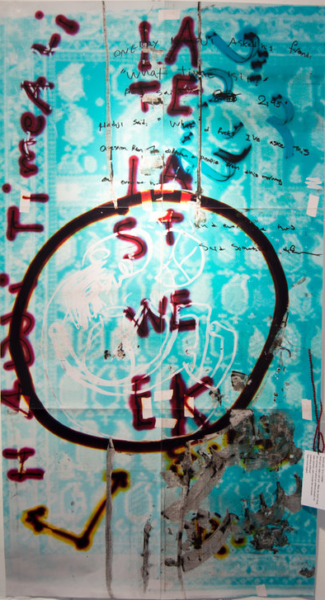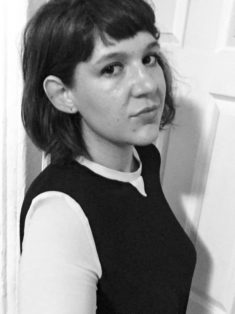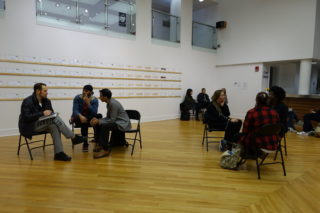Daisy Atterbury
We begin the day. We could begin anywhere. As Renee Gladman writes in Calamities, “I began the day...” and then again, “I began the day…,” finally bringing us to teaching and its challenges: “I began the day looking up at the whiteboard, wondering how I would do the thing I needed to do. My students were waiting. Robert Frost was their picture of contemporary poetry.”
I titled my undergraduate writing course, “Talking at the Boundaries: Writing about Literature,” after David Antin’s book of the same name (New Directions Press, 1976). Talking at the Boundaries is made up of stitched-together transcriptions of Antin’s improvisatory talks. The book insists on a few things. Antin says, “it is not the work of a professional.” Later: “what kind of professional was Socrates?”
To bring Antin’s ethos into a contemporary context and address the goals of the semester, we start by watching a TED Talk by Reggie Watts under the heading, “Reggie Watts disorients you in the most entertaining way” (2012). In the video, he plays his audience in a performance which turns on various forms of coded rhetoric (racialized, gendered) we use to signify knowledge, but which fall flat as empty signifiers without an infusion of meaningful content. With a very serious wink he asks, who/what are you listening to?
David Antin describes his own poetic endeavor by discussing writing in relation to a fluid (rather than fixed) practice: “an improvisation is not in ’prose,’ which is an image of the authority of ’right thinking’ conveyed primarily through ’right printing’––justified margins, conventional punctuation, and regularized spelling––this book has been printed without recourse to such appeals,” he says.
What is this notion of ‘right thinking,’ and are we expected to teach some form of ‘correct[ive] thought’ in our classrooms? Most would say no, when you put it like that. Not corrective. Not correct. What is prose.
“I began the day thinking about the university level — where it was and who was allowed to go there. I felt in my body a sense that there were a series of gates to pass through, a grand lawn, and then an elevator to take you down into the earth.” Gladman speaks to what is almost unspeakable in places of higher learning, those exchanges in academia which are underwritten in secret inflections of speech and movement designed to keep certain people out. Those gates she “felt in [her] body…” How do you teach writing to undergraduates when you yourself are curtailed, corrected, when you yourself do not endorse or practice ‘right thinking’? When the very nature of your work is seen as biting the hand that feeds.
Scholars pushed towards specialization and rigid disciplinary allegiances (sometimes out of self-preservatory necessity), are not always prepared to take on the teaching of writing with the understanding that the work of writing (its decencies, correctives, hidden motives, grievances, qualms, assumptions) is itself a living practice, one which is contested daily and fraught with the ugly histories of forced assimilation and the active and ongoing work of survivance and self-teaching. It’s hard to go there as a teacher, I think, partly because we treat writing like a dead discipline rather than like a living practice, even in writing-based fields like journalism, academia, history and politics. Certainly academia could do well to invest in writing as an ongoing conversation with very high stakes, one in which students and professors might weigh in--or are already doing so. Writing instructors talk to students about “stakes,” but rarely disclose their own.
Last week, The Nation published a poem I won’t link here, but which, as an example of the worst kind of appropriative language, became a rallying cry for writers demanding better: better publishing practices, better writing practices and less violence and offense, no more poems by white, ableist writers appropriating and then writing from the lived experiences of persons of color or disabled persons. What would it look like to teach writing of the now, which is to teach the response? Teach the comments section. (Where does ‘right thinking’ even occur.)
Donte Collins wrote a response poem on Twitter that as of now has gotten 2,200 likes, a “How Not To” to The Nation’s “How To.” This poem is rife with poetry, that is, it’s instructive about poetry as discourse.
In her new book Crafting Presence: The Essay in the American Context, Nicole B. Wallack talks about the importance of the essay in connection to what she calls “presence” in the writing. In an interview she says, “The essay is the genre of presence; no presence, no essay.” She stresses that her notion of presence is capacious and takes many forms, which is a useful re-thinking of the idea of teaching “voice” in the writing (the singularity of which poetry, as a form and as an approach, already destabilizes). Rather than thinking about voice, singular, can we think about voices, presences?
Absences, withholdings, refusals and silences are all powerful and strategic forms of, or even executions of, “presence” in writing, and even in showing up--when the speaker doesn’t wish to be or can’t really be perceived by others in the room, or when they aren’t available to show up within the confines of the rhetoric at hand, writing is available, is even gold. Poetry is there when the reader or speaker can’t possibly or doesn’t want to come to the table because of who’s sitting around it. What Wallack calls ‘presence,’ but what I usually call simply poetry, is a more nuanced way of arriving with control over the form and framework.
When we think about how notions of literacy are used within writing classrooms to demand that students perform in the writing by adhering to a more limited conception of ‘presence’ than the one Wallack offers--one we can think of as exemplifying ‘right thinking’--we can see that these expectations are closely tied to wider expectations about performing rigid identities and taking on particular roles in the wider social and political spheres. Amy Wan, in her book, Producing Good Citizens: Literacy Training in Anxious Times, discusses the ways classrooms sanction unspoken definitions of citizenship as connected to literacy, producing expectations that an individual’s legitimacy, the very legitimacy of the body, mind and status as human, is connected to both citizenship status and language proficiency: “Citizenship and literacy operate together to persuasively categorize, sort, and credential individuals."
What does ‘presence’ look like, or how is it produced, in Claudia Rankine’s Citizen or in Layli Long Soldier’s Whereas, which are books of yes, poetry, but also of essay? What about In Toni Jensen’s Women in the Fracklands, in which birds hold the work’s aura of violence so the narrator can move the essay forward, the events of the story punctuated by frequent interruption? Presence, in Camonghne Felix’s call on Twitter for coverage of The Nation’s poetry fiasco that acknowledges the credibility, voice, and accomplishments of writers of color doing the work to make explicit the power dynamics at hand?
How do the words make you feel? Angry. Nervous. Afraid. Challenged. What associations do they bring up for you? Citizenship. Status. Border.
In her poem “Badu Interviews Lamar,” Felix writes, “The other end, / has a / conception of who / what / comes from me, from within / no matter / passing / or playing ball. Was a / hole / building / up for this / pen, / I wanted to be / the best / so I’m / taking it.”
Talk about structures of feeling.
Co-conceive the work of ‘talking at the boundaries.’
In a collaboration with the Belladonna* collaborative and the Andrew W. Mellon Seminar on Public Engagement and Collaborative Research, Atterbury’s seminar at Queens College, CUNY has hosted contemporary poets in the past year for extended conversation and performance: Mina Zohal, Pamela Sneed and Chia-lun Chang participated in class visits over the course of the year, accompanied by publishers like Rachel Wilson (Belladonna*) and Mirene Arsanios (Makhzin).


